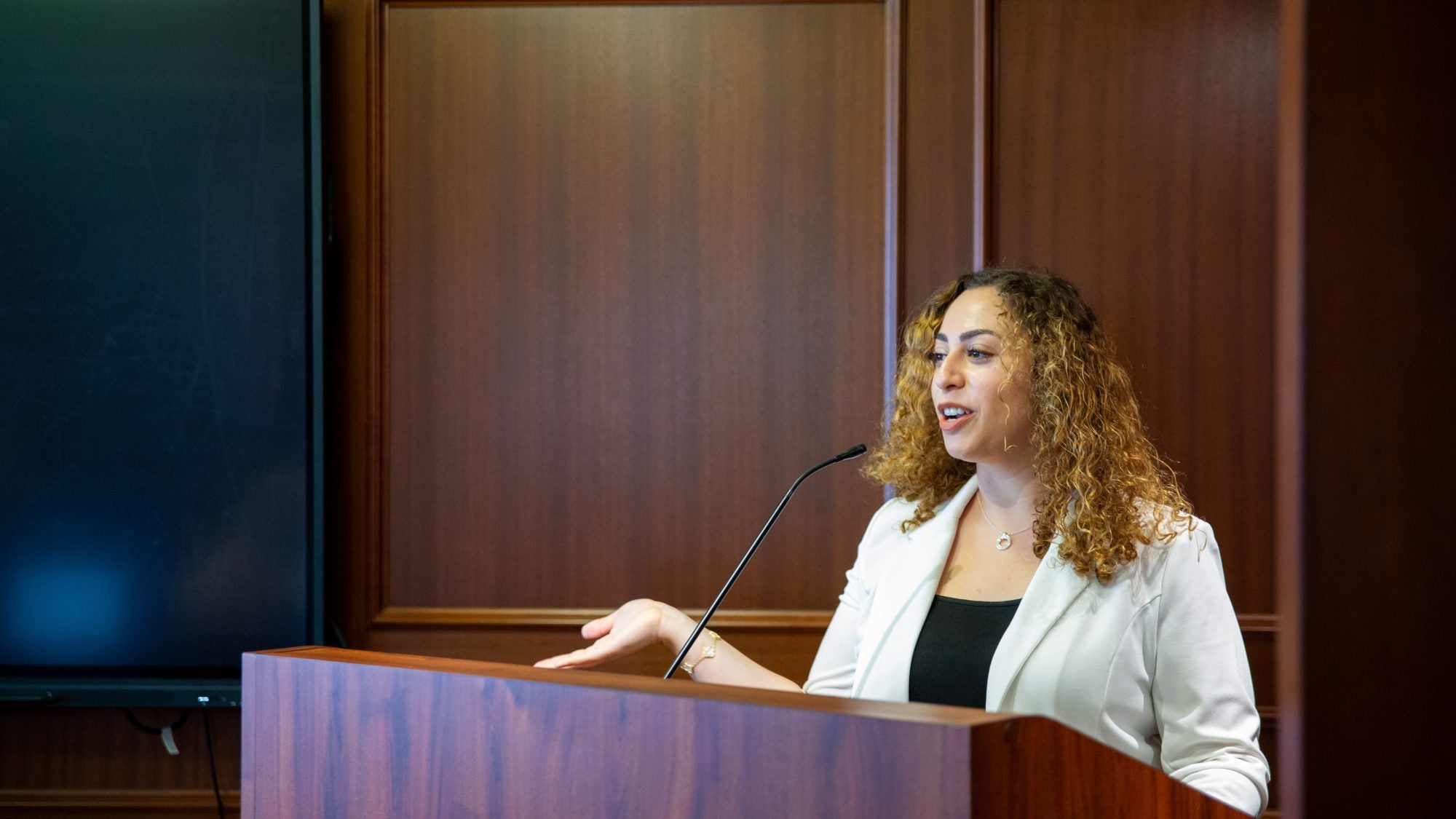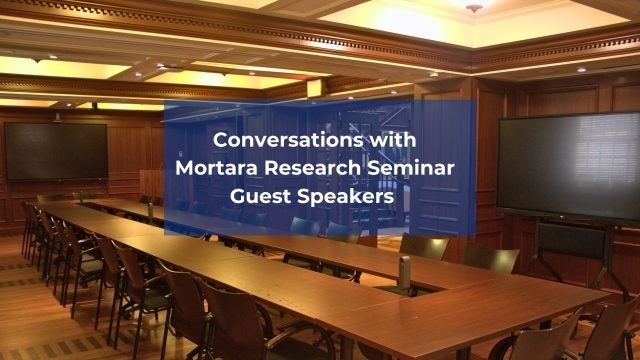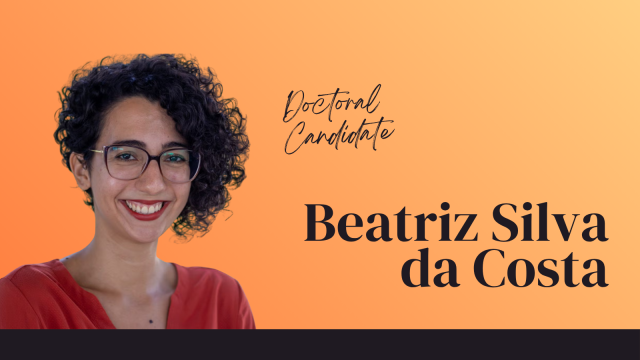As she prepares to graduate from Georgetown’s prestigious Master of Science in Foreign Service (MSFS) program, Samar Rawas leaves behind a lasting legacy at the Mortara Center for International Studies. For the past two years, Samar has served as the program coordinator for the Mortara Undergraduate Research Fellows (MURF) program, mentoring cohorts of undergraduate fellows and helping shape their research journeys. With her deep commitment to student development, thoughtful leadership, and enthusiasm for international affairs, she has been an integral part of the Mortara community. In this article, Samar reflects on her experience with the MURF program, her time at Georgetown, and what lies ahead.
About the MURF Program
- What motivated you to get involved with the MURF program?
When I first arrived at Georgetown, I knew I wanted to stay connected to mentorship. I’ve always believed in the power of creating pathways for others, especially for students who may be navigating research or academia for the first time. The MURF program immediately stood out to me because it centers undergraduate students in a really meaningful way. I was drawn to the idea of being part of a program that supports young scholars as they take on complex, global topics and develop the confidence to pursue their own research.
Coming from a background that blends international studies, public service, and community engagement, I saw the MURF role as a bridge between my own experiences and the kind of environment I wanted to help shape. It wasn’t just about administrative tasks or programming, it was about building a culture of trust, curiosity, and growth. That’s what made it so fulfilling.
- What did you enjoy most about working with the undergraduate research fellows?
There are so many things I loved about working with the MURFs, but what I appreciated most was the energy they brought to every conversation. These students are incredibly smart, but more than that, they are thoughtful, open, and deeply engaged in the world around them. I often felt inspired just listening to them talk through their research topics, whether it was about politics, economics, technology, or peacebuilding. They weren’t afraid to ask hard questions or challenge assumptions, and that kind of environment pushes everyone to grow.
I also enjoyed being someone they could turn to outside of the classroom. Whether it was helping them navigate a research roadblock or just checking in about life, I tried to create space for each fellow to feel seen and supported. Watching them develop their ideas from a rough concept into a fully formed project and seeing their confidence build over time was incredibly rewarding.
On the Mortara Center
- What did being part of the Mortara Center community mean to you?
The Mortara Center became one of the most important spaces for me during my time at Georgetown. It was a place where intellectual community and personal connection came together. I’ve always valued environments where people genuinely care about each other’s growth, and that’s what I found at Mortara. It’s not just about producing high-level research. It’s about building a community that supports meaningful dialogue, cross-disciplinary thinking, and mentorship at all levels.
I felt proud to be part of a center that values students and takes mentorship seriously. From the directors to the faculty affiliates to the staff, everyone was invested in helping students succeed and feel like they belonged. That’s not something you find everywhere, and it’s a big part of why I felt so connected to the work I was doing.
- What legacy do you hope to leave behind at Mortara?
I hope I’ve helped make the MURF program feel more student-centered, more accessible, and more grounded in community. One of my goals was to build systems that were not only more efficient but also more supportive. I worked to redesign Scriptorium hours to better meet student needs, assisted in re-designing the application process, and made sure our communication with fellows was clear and thoughtful. I also tried to listen closely when students shared feedback or concerns, and then actually act on that feedback.
More than anything, I want to be remembered as someone who cared deeply about the people in the program. I hope the fellows felt that they had someone in their corner, cheering them on and challenging them to keep growing. If I’ve helped even a few students feel more confident in their abilities or more excited about their future, then I consider that a success.
Georgetown and MSFS Reflections
- Are there particular courses, professors, or experiences that shaped your academic or professional goals?
One course that had a major impact on me was Mediation and Skills Processes. I took it during my first year in the MSFS program, and it completely shifted how I think about conflict, communication, and leadership. What I appreciated most was how hands-on the class was. We spent time practicing real-world mediation techniques, learning how to listen actively, manage tension, and build trust between people with very different perspectives.
That course helped me discover a genuine passion for conflict resolution. I realized how much I enjoy helping others work through difficult conversations and find common ground. It pushed me to go beyond the classroom and pursue mediation training, and eventually I became a certified mediator in the Virginia court system. That experience allowed me to work on real cases and confirmed that this is a path I want to keep exploring.
What started as an interesting class quickly turned into something that has shaped the direction of my career. I now know that I want to continue working in spaces where I can use these skills, whether that’s in diplomacy, development, or supporting dialogue in divided communities. That course gave me both the tools and the clarity to pursue work that feels meaningful and aligned with my values.
Looking Ahead
- How do you hope to apply what you’ve learned at Georgetown and through Mortara in your next chapter?
After graduation, I plan to continue working at the intersection of international affairs, public service, and program management. I am exploring opportunities where I can help design and lead initiatives that support communities, build inclusive systems, and create space for underrepresented voices. Whether that takes the form of policy work, research coordination, or grassroots programming, I want to be part of teams that are serious about impact and equity.
Everything I’ve learned at Georgetown and through Mortara has prepared me for this next step. I’ve gained the skills to navigate complex global challenges, but I’ve also learned the importance of building trust, mentoring others, and staying grounded in my values. I hope to carry that with me in every role I take on. What matters most to me is continuing to work in spaces where collaboration, curiosity, and compassion are at the center of the work.


